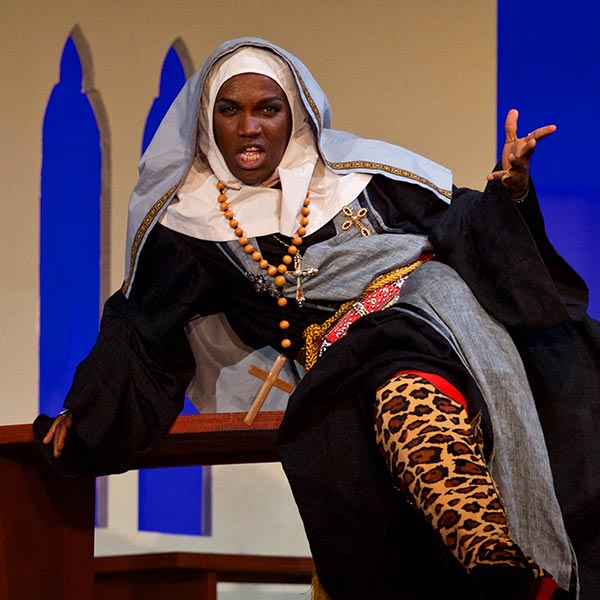
 rating=5] Comedy may be dependent on cultural context, but the comedic operas of Gioachino Rossini have been delighting audiences around the world for two hundred years. Even if the name Rossini isn’t familiar to you, you probably know his music for The Barber of Seville. But although Barber and his version of Cinderella have been consistently popular, Le Comte Ory hasn’t been seen as much. That could be because it’s based on a less popular intellectual “property,” because of it’s extremely demanding three lead roles, because Rossini had a harder time writing for French, or because of its surprising resolution to its central love triangle, but whatever the reason, it’s not because it is any less funny. And since an original production directed by Bartlett Sher debuted at New York’s Met in 2011, Ory has had a bit of a revival. That production has now arrived at the Lyric Opera of Chicago, where the opera is being performed for the first time in the company’s history by an outstanding cast, conducted by the Lyric’s new music director and bel canto expert Enrique Mazzola.
rating=5] Comedy may be dependent on cultural context, but the comedic operas of Gioachino Rossini have been delighting audiences around the world for two hundred years. Even if the name Rossini isn’t familiar to you, you probably know his music for The Barber of Seville. But although Barber and his version of Cinderella have been consistently popular, Le Comte Ory hasn’t been seen as much. That could be because it’s based on a less popular intellectual “property,” because of it’s extremely demanding three lead roles, because Rossini had a harder time writing for French, or because of its surprising resolution to its central love triangle, but whatever the reason, it’s not because it is any less funny. And since an original production directed by Bartlett Sher debuted at New York’s Met in 2011, Ory has had a bit of a revival. That production has now arrived at the Lyric Opera of Chicago, where the opera is being performed for the first time in the company’s history by an outstanding cast, conducted by the Lyric’s new music director and bel canto expert Enrique Mazzola.
The story takes place during the high medieval crusades, although Sher’s framing device is that we are watching these events as a theatrical presentation from around the late 1600s. (There is even a second stage onstage and a master of revels to signal each act’s beginning.) With most of the men absent, the married and unchaperoned women have retreated into the castle of the Countess Adèle (soprano Katheryn Lewek). However, they are willing to leave to hear the soothsaying and wisdom of a holy hermit who presents himself as a master in all things amorous. The hermit (tenor Lawrence Brownlee) is actually the devious Count Ory in disguise, who is hiding from his tutor (bass Mirco Palazzi) and his page, Isolier (mezzo Kayleigh Decker). Isolier is in love with the countess, and tells Ory that he plans to bypass her defenses of the castle by disguising himself in women’s clothing. This ultimately proves unnecessary, as Adèle reciprocates Isolier’s affection when they meet in public, but Ory remembers the scheme and decides to use it for himself, along with the whole retinue of his newly-arrived knights.
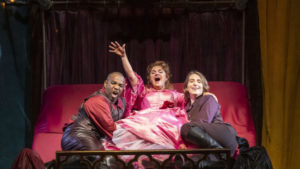
Despite the title character being essentially the villain, Le Comte Ory has an even lighter tone than Barber or Cinderella. It’s very fast-paced, upbeat, and in the hands of Sher and revival director Kathleen Smith Belcher, ceaselessly funny. Brownlee, Lewek, and Decker all rightly get credit in a lot of marketing materials for their technical singing proficiency, but they also display an adeptness for slapstick and character comedy rarely seen among so many singing actors in the same production. Lewek’s countess is a woman who delights in being extra, punctuating her declarations with full-bodied shrieks (she also regularly plays Mozart’s Queen of the Night). Brownlee has become well known to Lyric audiences in recent years for his good-humored, ironic physicality, which here extends to his intentionally extravagant coloratura as the vain count, and the count’s clever disguises for his voice as well as his figure. Decker is the heart of the play as the goofy, boyishly charming Isolier, who’s coming of age is about as much of an arc as is to be found here.
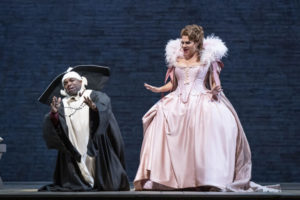
In case you’re afraid that a light story means simplistic music, that isn’t the case. Conductor Mazzola is in his element and everything sounds distinctly Rossini, though the flow of French lyrics instead of Rossini’s usual Italian give the show a distinct twist. It’s also a recurring joke that Rossini allows certain numbers to go on a bit long, although that doesn’t cause stagnation onstage; the device of a show-within-a-show means there’s always something interesting happening and these directors are good at crowd management. In addition to the leads, mezzo Zoie Reams as the countess’s mom-friend Ragonde, Palazzi as Ory’s exasperated but enabling baby-sitter, and baritone Ian Rucker as Ory’s accomplice and hype-man, Raimbaud, (filling in for Joshua Hopkins at the performance I attended) all have a good understanding of what a sex-comedy of zany schemes requires. By the way, if you haven’t already read of synopsis of this opera, I suggest not doing that before seeing the performance. The Lyric’s debut of a show that premiered in 1828 is a chance to experience something old as fresh.
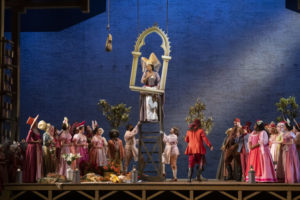
Le Comte Ory will continue at the Lyric Opera House, 20 N Upper Wacker Drive, Chicago, thru November 26, with the following showtimes:
November 22 7:00 pm
November 26 7:30 pm
Running time is two hours and forty minutes with one intermission.
Performances are in French with English supertitles. Streams are available to ticket purchasers.
The Lyric offers parking deals with Poetry Garage at 201 W Madison St. if inquired about in advance. Tickets start at $40; to order, visit LyricOpera.org or call 321-827-5600.
To see what others are saying, visit www.theatreinchicago.com, go to Review Round-Up and click “Le Comte Ory.”


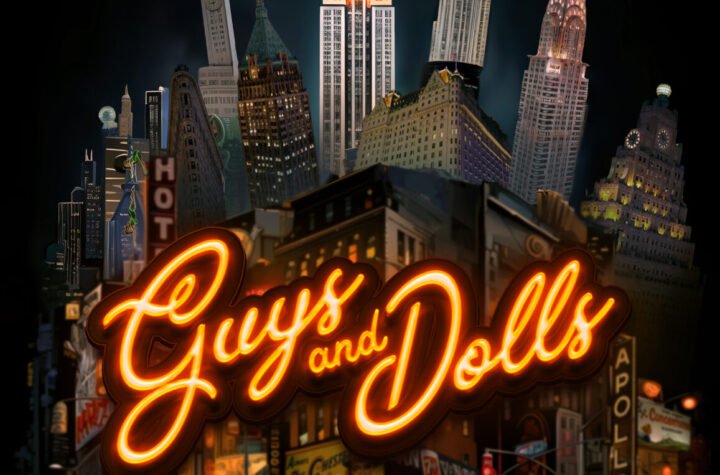

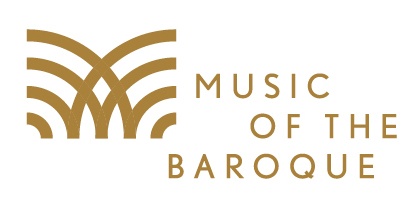

More Stories
“Guys & Dolls”
“The Music Man”
“The S Paradox” reviewed by Julia W. Rath